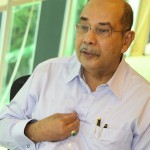“The upbringing is fundamental for nurturing love and forgiveness.”
H.E. Dr. Syed Hamid bin Syed Jaafar Albar is the former Malysian Minister of Foreign Affairs. He was born January 15, 1944 and is a politician from Malaysia. Formerly serving as a Malaysian Minister of Home Affairs, Albar now serves as the current chairman of the Land Public Transport Commission and is also a member of the United Malays National Organization (UMNO). Believed to be both well-educated and well-traveled, Albar was able to garner much public support in a short amount of time. According to him, the importance of love and forgiveness was something that was instilled to him, first and foremost, by his father, who, as a teacher, had firmly believed that learning such important ideals “starts in the house, which later can be translated into other environments.” When his father joined politics, during the short periods of time that he was home with his family, Albar says that the family would “sit together reading a story about his political experience, people, sacrifice, courage.” Through such family conversations, he learned to “believe in truth” and to not “get scared from saying it.” He also added that, in general, “the upbringing is fundamental for nurturing love and forgiveness.”
As a student, Hamid was active in UMNO, and he became a member of the UMNO Supreme Council in 1986. Following that, he joined the Malaysian Cabinet as an oil department minister before becoming the minister of law. Albar posits that love and forgiveness played a vital role in his post as a judge. “When I was a judge, every time I went to pass a sentence I would ask myself if I read everything correctly, whether I was prejudiced by the prosecution representation, whether the defense angered me,” he said. Specifically, he recalled a case where the role of forgiveness, in particular, weighed heavy on him. In the case, Albar was to make a decision in which his old teacher, who was quite rough with him, had to appear before him to defend his client. In the end, Albar found his teacher’s client guilty, but wondered if the teacher would think that his verdict was not based on the facts of the case, but rather as means of revenge. Because Albar had forgiven the teacher and held no ill feelings for him, he wanted to assure himself that the teacher felt the same, and thus he called him. In the conversation, he says, “I mentioned to him that my decision was based on the facts and evidence. I have sentenced him and if you think it is not correct, then you can appeal and my decision can be reversed.”
Later on, Albar was appointed the Defense Minister and following that, the Foreign Minister. In March of 2008, he was appointed the Home Minister, which he recalls was “the most difficult” of all. However, he made a decision, “that he needs to protect the society and that he will consult his consciousness before giving an advice.” Of his general ideals and beliefs that he follows as a politician, Albar emphasized love and forgiveness that are fundamental for leadership based on virtue, sincerity and trust. He believes that “it is very important to be compromising and conciliate with the people around you, which subsequently leads to inner satisfaction and peace.”



I believe what is most striking about Mr.Albar’s story is his belief that “the upbringing is fundamental for nurturing love and forgiveness.” If only all parents would nurture their children from an early age and instill within them the values of honesty, love and forgiveness, then we would have a world full of Mr.Albar and not a world full of hatred, violence and extremism.
Syed Hamid Albar is an exemplary man who dignifies what every person around the globe should strive to be. As he stated, forgiveness “starts in the house, which later can be translated into other environments.” Learning from the beginning that love and forgiveness is very crucial to any sustainable future for any nation is something not easily absorbed, but it can be so beneficial. While it is not the only way to learn about how peace can be achieved, it certainly is one of the best. I would urge all scholars who study international relations and conflict resolution skills to read about this man. He is absolutely someone to look up to and admire.